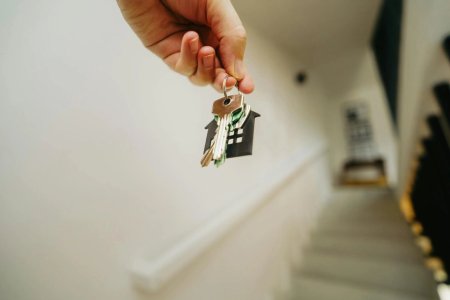Are you prepared for the rent hike? How a latest cap proposal might affect your wallet
By
Veronica E.
- Replies 0
Change may be on the horizon for renters feeling the squeeze of rising housing costs.
After months of uncertainty and ever-climbing prices, many individuals and families have found themselves having to make tough decisions just to stay afloat.
The burden of unpredictable rent hikes has left countless households feeling stretched thin and searching for answers.
Lawmakers are now moving forward with new efforts aimed at bringing some much-needed stability to the rental market, offering what could be a welcome break for those struggling to keep up.
And while the details are still unfolding, one thing is clear—these changes could soon make a big impact in Washington state.

The road to this potential new law has been anything but easy.
After months of negotiation and debate, both the Washington House and Senate have approved a bill aimed at capping annual residential rent increases.
The plan? Limit rent hikes to 7% plus inflation or 10%, whichever is lower.
Supporters hope this measure will offer renters a much-needed sense of predictability in today’s unpredictable housing market.
The bill specifically targets multi-family housing and represents a compromise following significant debate.
Initially, the House proposed a flat 7% cap, but moderate Senate Democrats pushed back, leading to the final version that added flexibility.
Manufactured homes were given extra protection, with rent increases capped at just 5%—a move that could benefit many seniors who rely on these more affordable housing options.
It’s important to know that not every rental property will be affected.
The bill makes exceptions for buildings owned by nonprofit organizations, public housing authorities, and owner-occupied duplexes, triplexes, and fourplexes.
Additionally, newly constructed properties will be exempt for their first 12 years, giving developers some breathing room.
The legislation also strengthens renter protections by prohibiting rent increases during the first year of a tenancy.
If a landlord tries to ignore these new rules, renters—and even the state attorney general—have the right to take legal action.
These safeguards are designed to help tenants feel a little more secure in their homes.
As with any major change, not everyone is on board.
Republican lawmakers have raised concerns that the cap could discourage development and drive landlords out of the market.
Meanwhile, most Democrats argue that renters desperately need some kind of stability, especially given the mounting challenges in the housing market.
The bill’s journey wasn’t without drama.
A procedural delay in the Senate temporarily stalled the vote, but lawmakers ultimately came together to pass the measure.
Housing advocates have expressed mixed feelings—while some believe the compromise weakens the original proposal, many still see it as a positive step toward helping renters who feel overwhelmed by steep rent increases.
Now, the next move belongs to Governor Bob Ferguson.
While he has kept quiet about his stance so far, the clock is ticking.
Following the end of the legislative session, the governor has 20 days (not counting Sundays) to either sign the bill into law or veto it.
If signed, the protections will take effect immediately, offering a new layer of security for Washington renters.
If you are a renter in Washington, this legislation could offer you more breathing room when it comes to planning your expenses.
It doesn’t freeze rents altogether, but it limits how much your landlord can increase them each year, helping to make housing costs a bit more predictable.
For members of the GrayVine community, it’s a good time to reassess your housing situation.
If you live in a multi-family unit or a manufactured home, these caps could give you added peace of mind as you map out your budget for the months ahead.
Just remember—knowing whether your property is exempt is key to understanding how this bill might affect you.
Read next: Evicted overnight: how this reliable tenant was forced out and left living in her car—are you at risk?

Have you seen a big rent increase recently? Do you feel hopeful that this proposal could make a difference? Or are you worried about how it might affect the housing market down the road? We would love to hear from you. Please share your experiences, thoughts, and questions in the comments below!
After months of uncertainty and ever-climbing prices, many individuals and families have found themselves having to make tough decisions just to stay afloat.
The burden of unpredictable rent hikes has left countless households feeling stretched thin and searching for answers.
Lawmakers are now moving forward with new efforts aimed at bringing some much-needed stability to the rental market, offering what could be a welcome break for those struggling to keep up.
And while the details are still unfolding, one thing is clear—these changes could soon make a big impact in Washington state.

New rent control measures aim to bring more stability and predictability to renters facing rising housing costs. Image Source: Pexels / Jakub Zerdzicki.
The journey of the rent increase cap proposal
The road to this potential new law has been anything but easy.
After months of negotiation and debate, both the Washington House and Senate have approved a bill aimed at capping annual residential rent increases.
The plan? Limit rent hikes to 7% plus inflation or 10%, whichever is lower.
Supporters hope this measure will offer renters a much-needed sense of predictability in today’s unpredictable housing market.
The bill specifically targets multi-family housing and represents a compromise following significant debate.
Initially, the House proposed a flat 7% cap, but moderate Senate Democrats pushed back, leading to the final version that added flexibility.
Manufactured homes were given extra protection, with rent increases capped at just 5%—a move that could benefit many seniors who rely on these more affordable housing options.
Also read: Outrageous! See how renters are made to queue up for one bathroom while their rent skyrockets—avoid their nightmare
Exemptions and protections
It’s important to know that not every rental property will be affected.
The bill makes exceptions for buildings owned by nonprofit organizations, public housing authorities, and owner-occupied duplexes, triplexes, and fourplexes.
Additionally, newly constructed properties will be exempt for their first 12 years, giving developers some breathing room.
The legislation also strengthens renter protections by prohibiting rent increases during the first year of a tenancy.
If a landlord tries to ignore these new rules, renters—and even the state attorney general—have the right to take legal action.
These safeguards are designed to help tenants feel a little more secure in their homes.
Also read: Roommate betrayal: Something didn’t add up—then the truth came out
The conversation heats up
As with any major change, not everyone is on board.
Republican lawmakers have raised concerns that the cap could discourage development and drive landlords out of the market.
Meanwhile, most Democrats argue that renters desperately need some kind of stability, especially given the mounting challenges in the housing market.
The bill’s journey wasn’t without drama.
A procedural delay in the Senate temporarily stalled the vote, but lawmakers ultimately came together to pass the measure.
Housing advocates have expressed mixed feelings—while some believe the compromise weakens the original proposal, many still see it as a positive step toward helping renters who feel overwhelmed by steep rent increases.
Also read: This woman was kicked out after a decade in her home—learn how a legal loophole could affect you too!
The governor’s move
Now, the next move belongs to Governor Bob Ferguson.
While he has kept quiet about his stance so far, the clock is ticking.
Following the end of the legislative session, the governor has 20 days (not counting Sundays) to either sign the bill into law or veto it.
If signed, the protections will take effect immediately, offering a new layer of security for Washington renters.
If you are a renter in Washington, this legislation could offer you more breathing room when it comes to planning your expenses.
It doesn’t freeze rents altogether, but it limits how much your landlord can increase them each year, helping to make housing costs a bit more predictable.
For members of the GrayVine community, it’s a good time to reassess your housing situation.
If you live in a multi-family unit or a manufactured home, these caps could give you added peace of mind as you map out your budget for the months ahead.
Just remember—knowing whether your property is exempt is key to understanding how this bill might affect you.
Read next: Evicted overnight: how this reliable tenant was forced out and left living in her car—are you at risk?
Key Takeaways
- Washington state legislature has passed a bill to cap annual residential rent increases at 7% plus inflation or 10%, whichever is lower.
- New rent control measures for traditional homes are set to expire after 15 years; manufactured home protections do not expire.
- Landlords cannot raise rents during the first year of tenancy, and violations allow tenants or the state attorney general to take legal action.
- The bill’s final version came after negotiation, featuring exemptions and a modified cap, but is viewed as a step toward greater renter protection.
Have you seen a big rent increase recently? Do you feel hopeful that this proposal could make a difference? Or are you worried about how it might affect the housing market down the road? We would love to hear from you. Please share your experiences, thoughts, and questions in the comments below!






